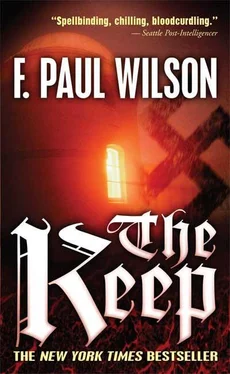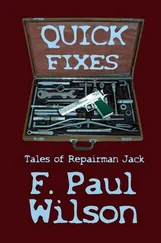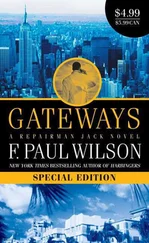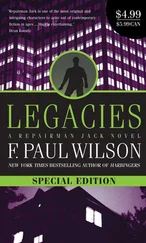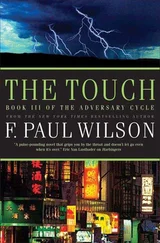F. Paul Wilson - The Keep
Здесь есть возможность читать онлайн «F. Paul Wilson - The Keep» весь текст электронной книги совершенно бесплатно (целиком полную версию без сокращений). В некоторых случаях можно слушать аудио, скачать через торрент в формате fb2 и присутствует краткое содержание. Жанр: Ужасы и Мистика, на английском языке. Описание произведения, (предисловие) а так же отзывы посетителей доступны на портале библиотеки ЛибКат.
- Название:The Keep
- Автор:
- Жанр:
- Год:неизвестен
- ISBN:нет данных
- Рейтинг книги:3 / 5. Голосов: 1
-
Избранное:Добавить в избранное
- Отзывы:
-
Ваша оценка:
- 60
- 1
- 2
- 3
- 4
- 5
The Keep: краткое содержание, описание и аннотация
Предлагаем к чтению аннотацию, описание, краткое содержание или предисловие (зависит от того, что написал сам автор книги «The Keep»). Если вы не нашли необходимую информацию о книге — напишите в комментариях, мы постараемся отыскать её.
The Keep — читать онлайн бесплатно полную книгу (весь текст) целиком
Ниже представлен текст книги, разбитый по страницам. Система сохранения места последней прочитанной страницы, позволяет с удобством читать онлайн бесплатно книгу «The Keep», без необходимости каждый раз заново искать на чём Вы остановились. Поставьте закладку, и сможете в любой момент перейти на страницу, на которой закончили чтение.
Интервал:
Закладка:
There was no telling what he might run into in these waters. The radio said Greece had fallen; that might or might not be true. There could be Germans in the Dardanelles now, or British or Russians. He had to avoid them all. This journey had not been planned; he had no papers to explain his presence. And time was against him. He needed every knot the engines could put out.
Once into the wider Sea of Marmara twenty miles ahead, he'd have maneuvering room and would run as far as his fuel would take him. When that got low, he would beach the boat and move overland to the Black Sea. It would cost him precious time, but there was no other way. Even if he had the fuel, he could not risk running the Bosporus. There the Russians would be thick as flies around a corpse.
He pushed on the throttles to see if he could coax any more speed from the engines. He couldn't.
He wished he had wings.
EIGHT
Bucharest, Romania
Monday, 28 April
0950 hours
Magda held her mandolin with practiced ease, the pick oscillating rapidly in her right hand, the fingers of her left traveling up and down the neck, hopping from string to string, from fret to fret. Her eyes concentrated on a sheet of handwritten music: one of the prettiest Gypsy melodies she had yet committed to paper.
She sat within a brightly painted wagon on the outskirts of Bucharest. The interior was cramped, the living space further reduced by shelves full of exotic herbs and spices on every wall, by brightly colored pillows stuffed into every corner, by lamps and strings of garlic hanging from the low ceiling. Her legs were crossed to support the mandolin, but even then her gray woolen skirt barely cleared her ankles. A bulky gray sweater that buttoned in the front covered a simple white blouse. A tattered scarf hid the brown of her hair. But the drabness of her clothing could not steal the shine from her eyes, or the color from her cheeks.
Magda let herself drift into the music. It took her away for a while, away from a world that became increasingly hostile to her with each new day. They were out there: the ones who hated Jews. They had robbed her father of his position at the university, ordered the two of them out of their lifelong home, removed her king—not that King Carol had ever deserved her loyalty, but still, he had been the king—and replaced him with General Antonescu and the Iron Guard. But no one could take away her music.
"Is that right?" she asked when the last note had echoed away, leaving the interior of the wagon quiet again.
The old woman sitting on the far side of the tiny, round, oak table smiled, crinkling up the dark skin around her black Gypsy eyes. "Almost. But the middle goes like this."
The woman placed a well-shuffled deck of checker-backed cards on the table and picked up a wooden naiou. Looking like a wizened Pan as she placed the pipes to her lips, she began to blow. Magda played along until she heard her own notes go sour, then she changed the notations on her sheet.
"That's it, I guess," she said, gathering her papers into a pile with a small sense of satisfaction. "Thank you so much, Josefa."
The old woman held out her hand. "Here. Let me see."
Magda handed her the sheet and watched as the old woman's gaze darted back and forth across the page. Josefa was the phuri dai, the wise woman of this particular tribe of Gypsies. Papa had often spoken of how beautiful she had once been; but her skin was weathered now, her raven hair thickly streaked with silver, her body shrunken. Nothing wrong with her mind, though.
"So this is my song." Josefa did not read music.
"Yes. Preserved forever."
The old woman handed it back. "But I won't play it this way forever. This is the way I like to play it now. Next month I may decide to change something. I've already changed it many times over the years."
Magda nodded as she placed the sheet with the others in her folder. She had known Gypsy music to be largely improvisational before she had started her collection. That was to be expected—Gypsy life was largely improvisational, with no home other than a wagon, no written language, nothing at all to pin them down. Perhaps that was what drove her to try to capture some of their vitality and cage it on a music staff, to preserve it for the future.
"It will do for now," Magda replied. "Maybe next year I'll see what you've added."
"Won't the book be published by then?"
Magda felt a pang. "I'm afraid not."
"Why not?"
Magda busied herself with putting her mandolin away, not wishing to answer but unable to dodge the question gracefully. She did not look up as she spoke. "I have to find a new publisher."
"What happened to the old one?"
Magda kept her eyes down. She was embarrassed. It had been one of the most painful moments in her life, learning that her publisher was reneging on their agreement. She still stung from it.
"He changed his mind. Said this was not the right time for a compendium of Romanian Gypsy music."
"Especially by a Jewess," Josefa added.
Magda looked up sharply, then down again. How true. "Perhaps." She felt a lump form in her throat. She didn't want to talk about this. "How's business?"
"Terrible." Josefa shrugged as she set the naiou aside and picked up her tarot deck again. She was dressed in the mismatched, cast-off clothes common to Gypsies: flowered blouse, striped skirt, calico kerchief. A dizzying array of colors and patterns. Her fingers, as if acting of their own volition, began shuffling the deck. "I only see a few of the old regulars for readings these days. No new trade since they made me take the sign down."
Magda had noted that this morning as she had approached the wagon. The sign over the rear door that had read "Doamna Josefa: Fortunes Told" was gone, as was the palmar diagram in the left window and the cabalistic symbol in the right. She had heard that all Gypsy tribes had been ordered by the Iron Guard to stay right where they were and to "deal no fraud" to the citizens.
"So, Gypsies are out of favor, too?"
"We Rom are always out of favor, no matter the time or place. We are used to it. But you Jews..." She clucked and shook her head. "We hear things ... terrible things from Poland."
"We hear them, too," Magda said, suppressing a shudder. "But we are also used to being out of favor." At least some of us are. Not her. She would never get used to it.
"Going to get worse, I fear," Josefa said.
"The Rom may fare no better." Magda realized she was being hostile but couldn't help it. The world had become a frightening place and her only defense of late had been denial. The things she had heard couldn't be true, not about the Jews, or about what was happening to Gypsies in the rural regions—tales of round-ups by the Iron Guard, forced sterilizations, then slave labor. It had to be wild rumor, scare stories. And yet, with all the terrible things that had indeed been happening...
"I do not worry," Josefa said. "Cut a Gypsy into ten pieces and you have not killed him; you have only made ten Gypsies."
Magda was quite certain that under similar circumstances you would only be left with a dead Jew. Again she tried to change the subject.
"Is that a tarot deck?" She knew perfectly well it was.
Josefa nodded. "You wish a fortune?"
"No. I really don't believe in any of that."
"To tell the truth, many times I do not believe in it either. Mostly the cards say nothing because there is really nothing to say. So we improvise, just as we do in music. And what harm is there in it? I don't do the hokkane baro; I just tell the gadjé girls that they are going to find a wonderful man soon, and the gadjé men that their business ventures will soon be bearing fruit. No harm."
Читать дальшеИнтервал:
Закладка:
Похожие книги на «The Keep»
Представляем Вашему вниманию похожие книги на «The Keep» списком для выбора. Мы отобрали схожую по названию и смыслу литературу в надежде предоставить читателям больше вариантов отыскать новые, интересные, ещё непрочитанные произведения.
Обсуждение, отзывы о книге «The Keep» и просто собственные мнения читателей. Оставьте ваши комментарии, напишите, что Вы думаете о произведении, его смысле или главных героях. Укажите что конкретно понравилось, а что нет, и почему Вы так считаете.
